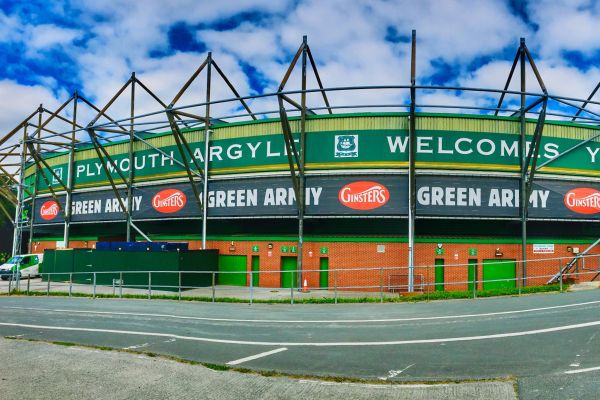It is the year 1620, and a bearded man yells, “That will do!”
He stands at the stern of a small wooden rowing boat, wearing a long dark coat, broad-brimmed hat, and silver-buckled shoes—clothing typical of a Pilgrim from the period. Behind him, the Atlantic stretches far and wide. The oarsmen stop rowing, allowing the boat to glide with its final momentum. The hull gently lodges into the sand.
“I’ll go first,” the man barks, taking a careful leap onto a large, flat rock. His shoes slap against the stone, and he steadies himself before gazing out at the unfamiliar land. He’s just stepped into the New World, modern-day Massachusetts. But this place, Plymouth, gets its name from a port city far across the ocean—from where this man and his fellow settlers began their legendary voyage aboard the Mayflower.
Little did they know, their story wouldn’t just be remembered in history books—it would echo into the world of football, shaping the identity of a club thousands of miles away.
From a Historic Voyage to the Football Pitch

Plymouth Argyle Football Club, founded in 1886, proudly bears the nickname “The Pilgrims”. It’s not just a catchy title—it’s a deep-rooted symbol of the city’s historic legacy.
The club’s nickname pays homage to the Pilgrim Fathers, who sailed from Plymouth’s Barbican aboard the Mayflower in 1620. The Mayflower Steps, a local landmark, mark the very point of departure. That journey changed the course of history—and became a metaphor for exploration, resilience, and vision. Traits that fans would later see mirrored on the football pitch.
A Club Anchored in History

At Home Park, Argyle’s iconic stadium, these connections are proudly on display. The club badge features a heraldic ship, symbolizing the Mayflower. Their mascot, Pilgrim Pete, dons traditional settler attire, complete with wide-brimmed hat. The fans chant, wave flags, and carry this spirit with them through decades of highs and lows.

Just like the original Pilgrims, Plymouth Argyle has weathered many storms—relegations, financial struggles, rebuilding years. But the spirit of “The Pilgrims” lives on. Every match feels like a step forward on a never-ending journey.
A City Steeped in Maritime Legacy
Plymouth isn’t just home to football and Pilgrims. It’s a city that has shaped the world. Sir Francis Drake once looked to sea from Plymouth Hoe. Darwin departed from here. Napoleon was held offshore. It’s a city of adventurers, thinkers, and explorers—and it makes perfect sense that the football club carries that same bold identity.

To watch Argyle at Home Park isn’t just to watch football. It’s to join a legacy. A club with roots as deep as the stone piers on its historic waterfront.
